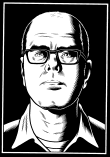Charles Burns is the author and illustrator of Black Hole.

Listen: Play in new window | Download (Running Time: 44:05 — 40.4MB)
Condition of Mr. Segundo: Avoiding conspiracy theorists.
Author: Charles Burns
Subjects Discussed: Responding to Vanessa Raney’s comparison between Black Hole and Sartre’s No Exit, anatomical closeups, World War II venereal disease films, intuitive artistic choices, the influence of postwar culture vs. personal experience, half-naked girls with tails, being an observer vs. experiencing something first-hand, the horrors of The Dark Side of the Moon, character judgment, keeping a consistency over ten years, drawing characters who keep their heads down, illustrating for The Believer, Alison Bechdel, avoiding reference shots, Dutch angles, the use of black, The Outer Limits, Conrad Hall, paneling, the split head on the page, the similarities between male and female characters, the static nature of Black Hole, characters occupying the same position over multiple frames, designing chapters with facing pages in mind, responding to Douglas Wolk’s observations, Burns on his strengths, the 1954 Comics Code and EC Comics, going to school with Lynda Barry and Matt Groening, the first moment when Burns realized he was a cartoonist, the relationship between writing and art, literary antecedents and narrative structure, adjusting Black Hole‘s structure over ten years, comfort food, narrative ambiguities, and not facing censorship.
EXCERPT FROM SHOW:
Burns: There’s moments in there where, even though they’re pretty sedate, they are very horrific to me. To be sitting in a room for four hours listening to Pink Floyd’s Dark Side of the Moon played over and over and over again — sitting around with a bunch of guys for hours and hours. It was horrific to me.
Correspondent: I wanted to touch upon how this personal experience relates to how people view your book, which is very much described as this allegory of sexuality in the United States. But it seems to me very interesting. Because people want to actually apply the “American” appellation to your book, as opposed to sort of look upon it as a depiction of real life. Do you think this is representative of them wanting to look onto Black Hole as a Great American Novel? Or is there something about the personal experience conveyed in American comics that calls for this…?
Burns: My intention was just to write a personal story. It was not to make some overall comment about America. I mean, that certainly comes into it. My opinions about American culture. That’s what I lived through. And that’s what I can talk about with authority. But I’m not making some — I’m not answering questions. I’m putting questions out there. Yeah, I have had people say, “Well, this is about American sexuality. American youth. Youth culture in the early 70’s.” It’s set in the 70’s because I can speak with authority about that specific part of my life.
(A lengthier excerpt from this program can be found here.)
Listen: Play in new window | Download (Running Time: 44:05 — 40.4MB)
1 Comment